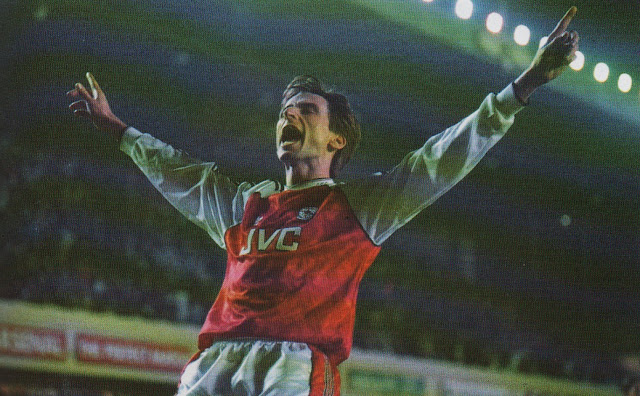Between 1987 and 1991, the balance of power shifted several times between Merseyside and North London. By the time Liverpool visited Highbury in early December 1990, George Graham’s side still had much to prove. Although their unbeaten start to the season made them clear title contenders again, the Old Trafford brawl - and subsequent two point deduction - could have hit them hard. But their reaction to adversity - in the league anyway - was outstanding. Arsenal thrashed Southampton 4-0 days after being handed their punishment, then beat QPR 3-1 at Loftus Road, coming from 1-0 down and scoring three in the last ten minutes.
When Arsenal met Liverpool in the Littlewoods Cup Final in 1987, the Gunners were the undoubted underdogs. At the time, most would have viewed Arsenal’s 2-1 win as a one-off, rather than a sign of a power shift. That was largely backed up by Liverpool taking their league title back from Everton the following season, with Arsenal finishing in sixth place, 24 points behind the champions.
Going in to the 1988-89 season, George Graham’s young team had shown promise, but Arsenal were not obvious title challengers. Losing their title to Arsenal was a shock, but the circumstances - the Hillsborough tragedy and the remarkable events at Anfield on 26th May 1989 - could go some way to explaining things, and Liverpool duly took the title back to Merseyside relatively comfortably in 1989/90.

After the QPR match however, Manchester United visited Highbury in the Rumbelows Cup, and thrashed Arsenal 6-2. This was a huge shock - George Graham’s Arsenal simply did not get hammered! Those that were there, however, knew the scoreline was a one off. Arsenal had clawed back a 3-0 deficit to 3-2 and with twenty minutes to go, looked as likely to progress as United. But United, with Lee Sharpe scoring a hat-trick in the performance of his life, were ruthless on the break and punished Arsenal for their gung-ho attempt to rescue the game. While slightly freakish, the outcome was hardly ideal preparation for the visit of the champions a few days later, in a keenly anticipated clash shown live on TV (when these things mattered).
Again, Arsenal demonstrated remarkable strength of character and bouncebackability (before the word was invented!) In his autobiography, George Graham recalled how Arsenal’s double winning team of 1970-71 had recovered from a 5-0 thrashing at Stoke. He now told his players they owed themselves and the club a massive performance.
Shortly before the match, Liverpool perhaps handed Arsenal the initiative, with a surprising team selection; Ray Houghton on the bench and Peter Beardsley dropped from the squad completely (Beardsley was free to make a slightly odd appearance in the TV studio). That said, Liverpool started the game brightly and had the better early chances, before Arsenal composed themselves, and won a corner after a promising attack.
The corner was cleared to Michael Thomas, who hit a fine, improvised volley towards goal, and after a goal-mouth scramble, referee Alan Gunn judged that Paul Merson’s header had crossed the line despite Barry Venison’s attempted clearance.
If there was an element of good fortune about Arsenal’s first goal, the Liverpool players also felt aggrieved by the nature of the second. Anders Limpar, in the form of his life, latched on to a loose ball and was clipped by Gary Gillespie. It looked like a foul, though Limpar went down rather easily. Lee Dixon dispatched the resulting penalty high into the net.
As the match drew to a close, Arsenal sealed a magnificent performance when Merson’s beautiful back heel found Alan Smith whose driven shot found the back of the net. Smith had recovered from a difficult start to the season to rediscover his best form. This was his eighth goal in eight games. Reflecting in his autobiography on his return to the sort of goal scoring form that had won him the golden boot just eighteen months earlier, Smith said he felt “full of running once more, my reactions, previously lethargic, now felt razor sharp.” He remembered that the goal made the opening credits of Saint and Greavsie, “Oddly enough, that meant quite a lot,” he says.
Arsenal meanwhile had reduced Liverpool’s lead to just three points, taken their unbeaten record - while maintaining their own - and reasserted themselves as the most dominant threat to the Merseyside team’s dominance. Famously, the Gunners lost just one league game all season, and despite the two point deduction, finished seven points clear of Liverpool.See also:
Top ten retro Christmas gift ideas
Highbury's 1991 title party
Classic match: Arsenal 3 Everton 1 (Littlewoods cup semi final 1988)
